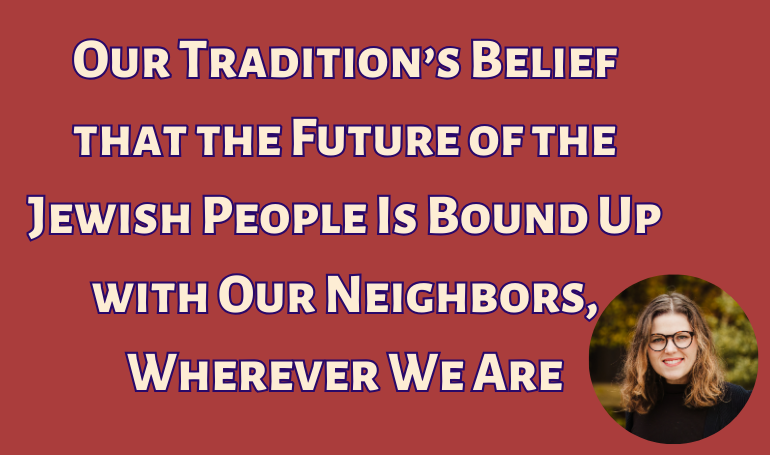
Our Tradition’s Belief that the Future of the Jewish People Is Bound Up with Our Neighbors, Wherever We Are
The following speech was given by Rabbi Rebecca Zimmerman Hornstein, BWC’s Executive Director at a webinar sponsored by Massachusetts Labor For a Free Palestine on December 5, 2023. She addressed three questions, grounding her comments in the hundred-year-old Jewish lineage that guides her community’s commitment to Palestinian and Jewish liberation.
- Why she as a Jew is taking action for a ceasefire
- Why her Jewish community is taking action for a ceasefire and why it’s not anti-Jewish or antisemitic to speak out in this urgent moment
- Recognizing and avoiding antisemitism in this moment
Why I as a Jew am pro-ceasefire
Like many others, I have experienced the months since October 7th through agonizing messages with Israeli and Palestinian family and friends on the ground. This time has been severely traumatic for them. My Israeli relatives who live on the Gaza border were in lockdown for 36 hours, with Hamas militants just yards away from their house. My cousin is a teacher in an elementary school serving the communities hit hardest by the 10/7 massacres. She had students, their parents and co-workers killed on that day.
A Palestinian friend’s family in Gaza are also going through hell. They are alive but sick, with little access to food, water and medicine. Every time my friend manages to get a message through, they prepare for it to be the last time they ever talk to their loved ones. They hear about all the images of death their loved ones in Gaza have already witnessed, hear about their neighbors and friends who have been killed and they just see no end in sight. My friends in the West Bank have also experienced really intense settler violence.
None of the people I know in Israel or Gaza deserve what they’ve been through these last few months. The violent path we’re on now gets us farther and farther away from any of them being able to live in safety, dignity, equality and freedom. We need an end to this and a long term political solution. We’ve also seen an increase in anti-Palestinian racism, antisemitism and islamophobia here in the US, which makes our Muslim, Palestinian and Jewish communities in the US less safe.
Why my Jewish community has taken action for a ceasefire, release of hostages and detainees and an end to the occupation and why it’s not anti-Jewish or antisemitic to speak out against those things
My community, the Boston Workers Circle, was founded by a group of sweatshop workers as a mutual aid society in 1892 on New York’s Lower East Side, to provide for each other what the state wasn’t providing for working class immigrants. We have always been deeply connected to the labor movement. In the early days you had to be a member of your union to be a member of what was then called the Workmen’s Circle, to get the health benefits, sick benefits, death and funeral benefits the organization provided. Our longer vision went beyond mutual aid to building solidarity and organization to change the capitalist relations that led to workers’ illness and premature deaths:
“The Workmen’s Circle knows that the aid which it can bring to the worker today is no more than a drop on a hot stone. It will do in time of need. But that there shall be no need–this is the true ideal. [We] desire to be one more link in the workers’ bond of solidarity, ultimately bringing on the day of complete emancipation from exploitation and oppression.”
Workers Circle 1901 Declaration of Principles
The Workers Circle’s origins are based in the belief that the future of the Jewish people was bound up in a shared future with our neighbors wherever we were. Our founders believed in fighting the antisemitism they were experiencing in Europe and then in the US through collective liberation—thought that Jewish liberation and safety, and the fight against antisemitism/anti-Jewish oppression, is tied to the liberation and safety of all people.
“Here-ness,” called “doykeit” in Yiddish, was developed by Jewish communists and socialists who were part of the Bundist movement at the same time as Jewish nationalism, known as Zionism. It’s not a new outlook, it has been part of our ideological lineage for over 100 years. Drawing on this lineage, our community sees the fight for justice for Palestinians as tied to this broader vision of justice and collective liberation
Today, we do movement building work in Boston as well as community building. We have been advocating for a ceasefire since the beginning of the current violence.
A few comments on how antisemitism is operating and being used in this moment
Antisemitism is a European invention that developed in the same historical context as white supremacy and colonialism. It’s part of white Christian supremacy, based in early Christian anti-Judaism, that in the modern era got folded into race science. The term itself was created by an antisemitic German Eugenicist to positively describe hatred towards Jews. Throughout history, it has protected systems of oppression and those who benefit from them by channeling popular discontent to ‘punch up’ at imagined ‘elite’ scapegoats. Antisemitism has been a core fuel of authoritarianism in times of crisis and discontent. Today, we can see it as a core part of right-wing Christian nationalist ideology.
In the 1970s, to ward off critique and maintain popular support after Israel’s military occupation of Gaza and the West Bank began, the Israeli government and its defenders abroad adopted a propaganda strategy called “the New antisemitism.” The ‘New antisemitism’ intentionally blurred the line between Israel the state and Jews the people. It labels criticism of Israel’s mistreatment of Palestinians as ‘antisemitic,’ rather than a point of political debate. This ‘New antisemitism’ has been codified into official definitions, most importantly the International Holocaust Remembrance Association definition of antisemitism, and policies used to target pro-Palestine activists, claiming that they are ‘antisemitic.’ The US House passed a resolution that does just that by codifying the IHRA definition of antisemitism.
This ‘New antisemitism’ that focuses on criticism of Israel does two things: it discredits pro-Palestine activism, and takes the focus off the very real white Christian antisemitism that is all around us. That is why it is incredibly important to discern real threats of antisemitism from the weaponization of antisemitism deployed through this “New Antisemitism” strategy. Antisemitism itself is part of larger systems of oppression. Those of us with progressive values need to fight it alongside other oppressions. And when antisemitic sentiments and tropes appear in our movements, it is used to marginalize our demand that the majority of Americans agree with right now in a really urgent, life or death moment for Palestinians. We must be careful not to inadvertently perpetuate it for both those reasons.
Recognizing and Avoiding Antisemitism
There’s nothing you can do to fully prevent the use of the ‘new antisemitism’ strategy, but taking antisemitism seriously and taking the time to understand it really helps. Part of the impact of centuries of antisemitism is that many Jews have been isolated from our allies. The right has been very effective in leveraging a trauma-based story–no one cares if we live or die–that many Jews feel, which feeds directly into the divide and conquer strategy. Acknowledging the reality of antisemitism goes a really long way to undermine this divide and conquer strategy, fight isolation and build a new, liberating story of ‘us’ that includes Jews.
Some things to keep in mind + pay attention to to avoid antisemitism in our Palestine solidarity work:
- Israel is not the Jewish people, so opposing Israel or Zionism as a political ideology is not antisemitic as long as you stay away from actual antisemitism (discrimination, prejudice, hostility or violence against Jews for being Jewish or against Jewish institutions for being Jewish).
- Associating Jews with Israel is antisemitic: most Jews you meet have literally nothing to do with the state of Israel and implying they have some power over what Israel is doing just because they are Jewish fits directly into antisemitic conspiracy thinking.
- Don’t target Jewish religious events or Jewish organizations that don’t have real political power when it comes to this issue—focus on targets who have the most power related to our demands.
- Build relationships with Jewish, Palestinian, Muslim groups that share your values.
- Listen to stakeholders, even if you don’t agree with them.
- Don’t throw allies under the bus – do help them learn and grow.
- Be attentive with your language (no tropes or conspiracy theories about Jews!).
- Address antisemitism when it shows up.
- Show solidarity with Jews when targeted by antisemitism.
